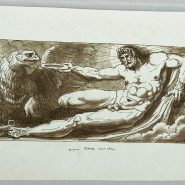King Midas is remembered for his golden touch, but his story of musical judgment reveals a deeper flaw: the failure to recognize harmony.
In Roman myth, Midas’s folly shifts from greed to ignorance, as he chooses noise over beauty and suffers a punishment that mirrors his tone-deaf judgment.
The tale, as retold by Ovid, shows that true discernment is not a gift of the senses, but a virtue of the soul — and that arrogance against divine order is always met with irony rather than mercy.
Characters and Setting
Midas ruled over Phrygia, a land rich in vineyards and gold, where Bacchus’s worship thrived. His kingdom was prosperous, his vaults full, yet his understanding shallow.
The gods once blessed him with the golden touch — a gift he soon regretted, for even his food turned to metal. Freed from that curse, he might have learned humility. But pride is not so easily melted.
When the rustic god Pan, proud of his reed pipes, challenged the radiant Apollo to a contest of music, Midas stood among the mortal witnesses. It was there, in the valley of Mount Tmolus, that his mind again revealed its folly.
The Contest of Sound
The Muses gathered to judge, and the mountain itself — Tmolus, wise and silent — presided as arbiter. Pan played first, his tune wild and vigorous. The nymphs clapped in rhythm, the air pulsed with rustic joy, and the crowd cheered.
Then Apollo raised his lyre, and silence spread like dawn. His melody was pure geometry: sound disciplined into perfection, harmony that mirrored the order of the cosmos. When the final chord faded, Tmolus bowed to the god of light and declared Apollo victor.
All applauded — all except Midas, who frowned and said that Pan’s melody pleased him more. His words fell like a discordant note in a divine symphony.
The Punishment
Apollo did not rage. His punishment was subtler, crafted to reveal the nature of Midas’s defect. He touched the king’s head, and in that instant, Midas felt his ears lengthen and thicken into those of a donkey. They were not monstrous, but comical — a gentle insult that mocked his inability to hear true harmony.
Mortified, Midas wrapped his head in a turban to conceal his shame. For months, he ruled as before, his secret known only to his barber, who lived in dread of his master’s wrath.
The Whispering Reeds
Yet secrets, like rivers, always find an outlet. The barber, unable to bear his burden, went to a nearby meadow, dug a hole, and whispered into the earth, “King Midas has ass’s ears.” Then he covered the hole and left.
But reeds grew upon that spot, and when the wind passed through them, they whispered the same words to the air. “King Midas has ass’s ears,” they murmured endlessly, so that all the valley learned what Midas had sought to hide. The earth itself proclaimed what folly had tried to bury.
Reflection and Regret
When Midas heard the reeds sing his secret, he knew that his shame could not be hidden from the world or the gods. Yet even this humiliation softened him. He began to see that Apollo’s light revealed not only truth but mercy — that divine correction aims not to destroy but to refine.
In some accounts, Midas renounced royal pride altogether, abandoning his throne to worship Pan in the wild. But Ovid leaves the tale open, letting the lesson speak for itself: that ignorance of beauty is its own disfigurement.
Symbolism and Interpretation
In Roman moral philosophy, the myth of Midas expressed the danger of confusing pleasure with virtue. Pan’s music delights the senses; Apollo’s instructs the spirit.
Midas’s preference for noise over harmony symbolizes a mind ruled by impulse rather than intellect. The ass’s ears are not merely punishment but revelation — an outward sign of inward dullness. The whispering reeds represent nature’s complicity with truth: even the elements testify against arrogance.
Through irony, the gods teach discernment, showing that aesthetic failure is moral failure in disguise.
Cultural Legacy
Roman poets and philosophers embraced the tale as a parable of judgment and humility. Artists depicted Midas with his long ears hidden beneath his crown, a symbol of secret ignorance.
In Roman satire, “Midas’s ears” became shorthand for the foolish ruler who listens to flattery instead of reason. Musicians and rhetoricians alike invoked Apollo’s victory as a metaphor for discipline — that art, like virtue, requires the courage to prefer truth over popularity.
The story’s quiet humor masks its gravity: civilization depends on the ability to distinguish harmony from noise.
Gods involved: Apollo, Pan, Bacchus
Based on classical sources in the public domain, including Ovid’s Metamorphoses and related translations available via Project Gutenberg and Wikisource.








